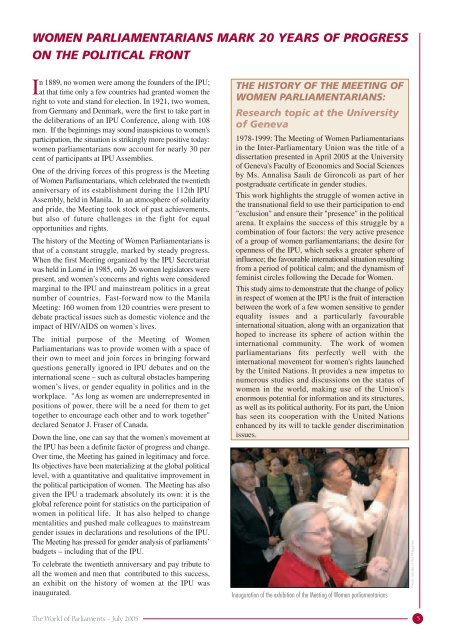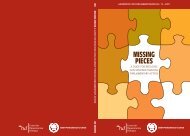PDF 631 Kb - Inter-Parliamentary Union
PDF 631 Kb - Inter-Parliamentary Union
PDF 631 Kb - Inter-Parliamentary Union
Create successful ePaper yourself
Turn your PDF publications into a flip-book with our unique Google optimized e-Paper software.
WOMEN PARLIAMENTARIANS MARK 20 YEARS OF PROGRESS<br />
ON THE POLITICAL FRONT<br />
In 1889, no women were among the founders of the IPU;<br />
at that time only a few countries had granted women the<br />
right to vote and stand for election. In 1921, two women,<br />
from Germany and Denmark, were the first to take part in<br />
the deliberations of an IPU Conference, along with 108<br />
men. If the beginnings may sound inauspicious to women's<br />
participation, the situation is strikingly more positive today:<br />
women parliamentarians now account for nearly 30 per<br />
cent of participants at IPU Assemblies.<br />
One of the driving forces of this progress is the Meeting<br />
of Women Parliamentarians, which celebrated the twentieth<br />
anniversary of its establishment during the 112th IPU<br />
Assembly, held in Manila. In an atmosphere of solidarity<br />
and pride, the Meeting took stock of past achievements,<br />
but also of future challenges in the fight for equal<br />
opportunities and rights.<br />
The history of the Meeting of Women Parliamentarians is<br />
that of a constant struggle, marked by steady progress.<br />
When the first Meeting organized by the IPU Secretariat<br />
was held in Lomé in 1985, only 26 women legislators were<br />
present, and women’s concerns and rights were considered<br />
marginal to the IPU and mainstream politics in a great<br />
number of countries. Fast-forward now to the Manila<br />
Meeting: 160 women from 120 countries were present to<br />
debate practical issues such as domestic violence and the<br />
impact of HIV/AIDS on women’s lives.<br />
The initial purpose of the Meeting of Women<br />
Parliamentarians was to provide women with a space of<br />
their own to meet and join forces in bringing forward<br />
questions generally ignored in IPU debates and on the<br />
international scene – such as cultural obstacles hampering<br />
women’s lives, or gender equality in politics and in the<br />
workplace. "As long as women are underrepresented in<br />
positions of power, there will be a need for them to get<br />
together to encourage each other and to work together"<br />
declared Senator J. Fraser of Canada.<br />
Down the line, one can say that the women's movement at<br />
the IPU has been a definite factor of progress and change.<br />
Over time, the Meeting has gained in legitimacy and force.<br />
Its objectives have been materializing at the global political<br />
level, with a quantitative and qualitative improvement in<br />
the political participation of women. The Meeting has also<br />
given the IPU a trademark absolutely its own: it is the<br />
global reference point for statistics on the participation of<br />
women in political life. It has also helped to change<br />
mentalities and pushed male colleagues to mainstream<br />
gender issues in declarations and resolutions of the IPU.<br />
The Meeting has pressed for gender analysis of parliaments’<br />
budgets – including that of the IPU.<br />
To celebrate the twentieth anniversary and pay tribute to<br />
all the women and men that contributed to this success,<br />
an exhibit on the history of women at the IPU was<br />
inaugurated.<br />
THE HISTORY OF THE MEETING OF<br />
WOMEN PARLIAMENTARIANS:<br />
Research topic at the University<br />
of Geneva<br />
1978-1999: The Meeting of Women Parliamentarians<br />
in the <strong>Inter</strong>-<strong>Parliamentary</strong> <strong>Union</strong> was the title of a<br />
dissertation presented in April 2005 at the University<br />
of Geneva's Faculty of Economics and Social Sciences<br />
by Ms. Annalisa Sauli de Gironcoli as part of her<br />
postgraduate certificate in gender studies.<br />
This work highlights the struggle of women active in<br />
the transnational field to use their participation to end<br />
"exclusion" and ensure their "presence" in the political<br />
arena. It explains the success of this struggle by a<br />
combination of four factors: the very active presence<br />
of a group of women parliamentarians; the desire for<br />
openness of the IPU, which seeks a greater sphere of<br />
influence; the favourable international situation resulting<br />
from a period of political calm; and the dynamism of<br />
feminist circles following the Decade for Women.<br />
This study aims to demonstrate that the change of policy<br />
in respect of women at the IPU is the fruit of interaction<br />
between the work of a few women sensitive to gender<br />
equality issues and a particularly favourable<br />
international situation, along with an organization that<br />
hoped to increase its sphere of action within the<br />
international community. The work of women<br />
parliamentarians fits perfectly well with the<br />
international movement for women's rights launched<br />
by the United Nations. It provides a new impetus to<br />
numerous studies and discussions on the status of<br />
women in the world, making use of the <strong>Union</strong>'s<br />
enormous potential for information and its structures,<br />
as well as its political authority. For its part, the <strong>Union</strong><br />
has seen its cooperation with the United Nations<br />
enhanced by its will to tackle gender discrimination<br />
issues.<br />
Inauguration of the exhibition of the Meeting of Women parliamentarians<br />
Photo Senate of the Philippines<br />
The World of Parliaments - July 2005<br />
5
















